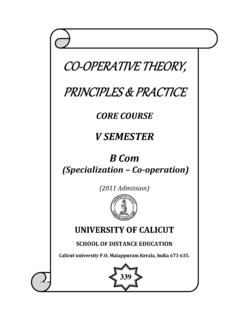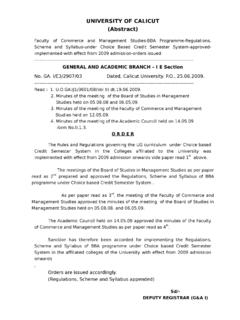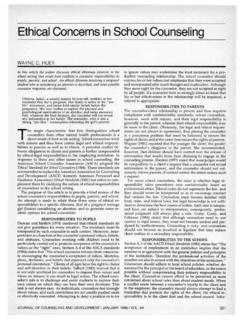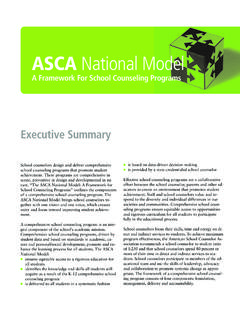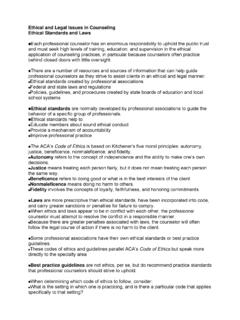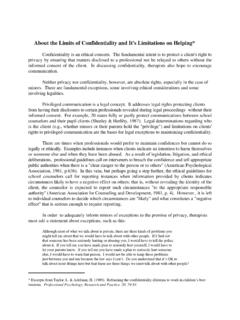Transcription of BASICS OF COUNSELlING PSYCHOLOGY
1 BASICS OF COUNSELlINGPSYCHOLOGYV SEMESTERCORE COURSEB ScCOUNSELLINGPSYCHOLOGY(2011 Admission)UNIVERSITY OF CALICUTSCHOOL OF DISTANCE EDUCATIONC alicut university ,Malappuram Kerala, India673 of Distance EducationBasics of COUNSELlING PsychologyPage2 UNIVERSITY OF CALICUTSCHOOL OF DISTANCE EDUCATIONSTUDY MATERIALCore CourseBSc COUNSELlING PsychologyVSemesterBASICS OF COUNSELlING PSYCHOLOGYP repared&ScrutinizedbyProf. (Dr.) C. Jayan,Dept. of PSYCHOLOGY ,University of :Computer Section, SDE ReservedSchool of Distance EducationBasics of COUNSELlING PsychologyPage3 ContentsPage of Distance EducationBasics of COUNSELlING PsychologyPage4 school of Distance EducationBasics of COUNSELlING PsychologyPage5 MODULE IDefinition and features of counseling psychologyCounseling PSYCHOLOGY is a psychological specialty that facilitates personaland interpersonal functioning across the life span with a focus on emotional,social, vocational, educational, health-related, developmental, and organizationalconcerns.
2 Through the integration of theory, research, and practice, and with asensitivity to multicultural issues, this specialty encompasses a broad range ofpractices that help people improve their well-being, alleviate distress andmaladjustment, resolve crises, and increase their ability to live morehighlyfunctioning lives. counseling PSYCHOLOGY is unique in its attention both to normaldevelopmental issues and to problems associated with physical, emotional, andmental disorders. Populations served by counseling Psychologists includepersons of allages and cultural backgroundsPurpose and goals of counselingThe main objective of counseling is to bring about a voluntary change inthe client. For this purpose the counselor provides facilities to help achieve thedesired change or make the suitable goal of counseling is to helpindividuals overcome their immediate problems and also to equip them to meetfuture problems.
3 counseling , to be meaningful has to be specific for each clientsince it involves his unique problems and expectations. The goals of counselingmay be described as immediate, long-range, and process goals. A statement ofgoals is not only important but also necessary, for it provides a sense of directionand purpose. Additionally it is necessary for a meaningful evaluation of theusefulness of counselor has the goal of understanding the behavior, motivations,and feelings of the counselee. The counselor has the goals are not limited tounderstanding his clients. He has different goals at different levels of immediate goal is to obtain relief for the client and the long-range goal is tomake him a fully functioning person.
4 Both the immediate and long-term goalsare secured through what are known as mediate or process counseling goals are unique to each client and involve a consideration ofthe client s expectations as well as the environmental aspects. Apart from thespecific goals, there are two categories of goals which are common to mostcounseling situations. These are identified as long-range and process goals. Thelatter have great significance. They shape the counselee and counselors interrelations and behavior. The process goals comprise facilitating proceduresfor enhancing the effectiveness of of Distance EducationBasics of COUNSELlING PsychologyPage6 The general public tends to view counseling as a remedial function andemphasizes immediate goals, such as problem resolution, tension reduction, andthe like.
5 Counselee may refer to the resolution of a particular conflict or problemsituation. However, the goals of counseling are appropriately concerned withsuch fundamental and basic aspects such as self-understanding and self-actualization. These help provide the counselee with self-direction and self-motivation. counseling in its spirit and essence is generative. Itaims at assistingthe individual to develop such that he becomes psychologically mature and iscapable of realizing his potentialities has no magical solutions. The only meaningful, sensible andrealistic view of counseling is thatit is not and cannot be everything toeverybody. It is concerned with helping individuals find realistic and workablesolutions to their problems by helping them gain an insight into themselves sothat they are able to utilize their own potentialities andopportunities and thusbecome self-sufficient, self-directed and counselingProfessional counseling is the process whereby specially trained individualsprovide academic, career or vocational guidance, provide problem-solving supportand expertise, provide support and/or expertise specific to certain biologicalthreats, or provide support and expertise to individuals, families, andcommunities as they strive towards optimum wellness.
6 The requirements to be aprofessional counselor vary from one continent to another and from onetownship/village to another. Professional counselors are different from traditionalsources of support or guidance in that they have received formal training andsupervision in the practice of providing support or guidance and adhere to clear,expert-defined standards of practice. These standards of practice are often calledCodes of in IndiaCounselling needs in the Indian context emerge against the background oftremendous socialchange. In addition, the last ten years of economic reformhave enhanced the pace of these changes and further transformed life services are poorly defined and presently anyone at all with little orno training can offer these services.
7 Available COUNSELlING services are largelybased on Western approaches to PSYCHOLOGY . These approaches have been widelycriticised as not being relevant to the Indian cultural context. A relevant andculturally valid COUNSELlING PSYCHOLOGY therefore hasremained a fledglingdiscipline. Psychological thought is not new to India, and ancient traditionspresent ideas and constructs that are rich in possibilities for of Distance EducationBasics of COUNSELlING PsychologyPage7 ethical and Professional issues of counselingPrinciples direct attention toimportant ethical responsibilities. Eachprinciple is described below and is followed by examples of good practice thathave been developed in response to that decisions that are strongly supported by one or more of theseprinciples without any contradiction from others may be regarded as reasonablywell founded.
8 However, practitioners will encounter circumstances in which it isimpossible to reconcile all the applicable principles and choosing betweenprinciples may be required. A decision or course of action does not necessarilybecome unethical merely because it is contentious or other practitioners wouldhave reached different conclusions in similar circumstances. A practitioner sobligation is to consider all the relevant circumstances with as much care as isreasonably possible and to be appropriately accountable for decisions : honouring the trust placed in the practitionerBeing trustworthy is regarded as fundamental to understanding andresolving ethical issues. Practitioners who adopt this principle: act in accordancewith the trust placed in them; regard confidentiality as an obligation arising fromthe client s trust; restrict any disclosure of confidential information about clientsto furthering the purposes forwhich it was originally : respect for the client s right to be self-governingThis principle emphasizes the importance of the client s commitment toparticipating in COUNSELlING or psychotherapy, usually on a voluntary who respect their clients autonomy: ensure accuracy in anyadvertising or information given in advance of services offered; seek freely givenand adequately informed consent; engage in explicit contracting in advance ofany commitment by the client.
9 Protect privacy; protect confidentiality; normallymake any disclosures of confidential information conditional on the consent ofthe person concerned; and inform the client in advance of foreseeable conflicts ofinterest or as soon as possible after such conflicts become apparent. Theprinciple of autonomy opposes the manipulation of clients against their will, evenfor beneficial social : a commitment to promoting the client s well-beingThe principle of beneficence means acting inthe best interests of the clientbased on professional assessment. It directs attention to working strictly withinone s limits of competence and providing services on the basis of adequatetraining or experience. Ensuring that the client s best interestsare achievedrequires systematic monitoring of practice and outcomes by the best availablemeans.
10 It is considered important that research and systematic reflection informpractice. There is an obligation to use regular and on-going supervision toenhancethe quality of the services provided and to commit to updating practiceSchool of Distance EducationBasics of COUNSELlING PsychologyPage8by continuing professional development. An obligation to act in the best interestsof a client may become paramount when working with clients whose capacity forautonomy is diminishedbecause of immaturity, lack of understanding, extremedistress, serious disturbance or other significant personal : a commitment to avoiding harm to the clientNon-maleficence involves: avoiding sexual, financial, emotional or anyother form of client exploitation; avoiding incompetence or malpractice; notproviding services when unfit to do so due to illness, personal circumstances orintoxication.

